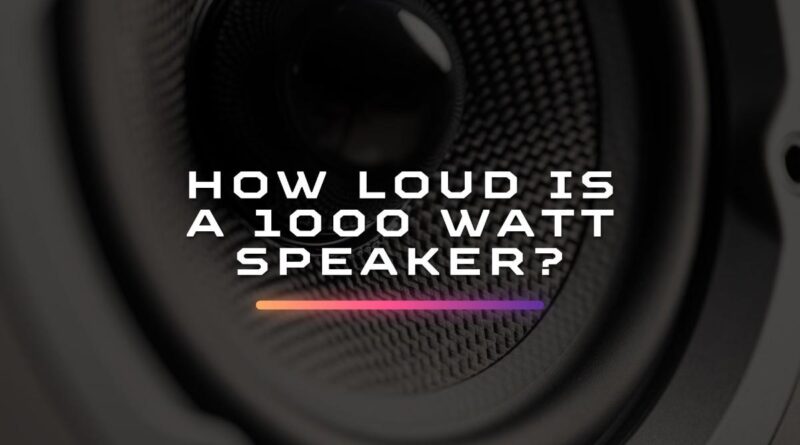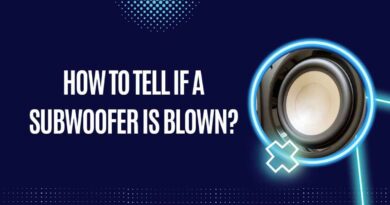How Loud Is A 1000 Watt Speaker? (A Detailed Comparison)
Have you ever wondered about those big, powerful speaker systems with their hefty wattage ratings? Do more watts really mean more volume? We’ll clear up that misconception and look into what actually makes a speaker loud. We’ll talk about things like speaker efficiency, sensitivity, and decibels to help you pick the right speaker for you. Get ready to learn the truth about speaker loudness and crank up the knowledge!
Understanding Speaker Wattage and Sound Output
The wattage of a speaker is a crucial factor in determining its loudness, but it’s not the only factor. The sound output of a speaker, measured in decibels (dB), is influenced by several other components including sensitivity, room size, and acoustics.
Speaker Sensitivity
Speaker sensitivity is a measure of how effectively a speaker converts power (watts) into sound (decibels). Typically, a speaker with a higher sensitivity will be louder at the same wattage than one with lower sensitivity. For example, a speaker with a sensitivity of 90 dB will sound significantly louder at 1 watt than a speaker with a sensitivity of 85 dB.
Room Acoustics and Size
The size and acoustics of the room also play a significant role. In a smaller or acoustically treated room, a 1000 watt speaker can seem overpoweringly loud, while in a large open space, the same speaker might struggle to fill the area.
Key Takeaways:
- Speaker sensitivity significantly affects loudness.
- Room size and acoustics can enhance or diminish the perceived loudness.
Comparing 1000 Watt Speakers In Different Environments
To understand how a 1000 watt speaker performs under various conditions, let’s compare its output in two different environments: a home theater and an outdoor setting.
Home Theater Setup
In a home theater, speakers are usually close to the audience, and the room’s acoustics can be controlled. A 1000 watt speaker in this setting can provide a rich, immersive listening experience without needing to operate at full capacity. The controlled environment allows for clear, detailed sound at lower volumes.
Outdoor Setting
Outdoors, the lack of boundaries means sound waves disperse freely. Here, a 1000 watt speaker needs to work harder to achieve the same level of loudness. However, for large gatherings or events, the power of a 1000 watt speaker can be ideal to cover wider areas effectively.
Key Takeaways:
- Indoors, a 1000 watt speaker can operate efficiently at lower volumes due to controlled acoustics.
- Outdoors, the same speaker requires more power to cover larger areas.
Technical Specifications and Their Impact on Performance
When comparing 1000 watt speakers, it’s essential to consider their technical specifications beyond just wattage. Let’s break down some key specs that influence performance.
Frequency Response
Frequency response indicates the range of sound frequencies the speaker can reproduce. A wider frequency response means the speaker can deliver both lower bass and higher treble sounds clearly.
Impedance
Impedance affects how much power a speaker draws from its amplifier. Lower impedance (measured in ohms) generally means more power can be drawn, potentially increasing loudness.
Key Takeaways:
- A broader frequency response enhances audio quality across different types of music and sounds.
- Lower impedance allows for greater power draw and possibly greater loudness.
Types of 1000 Watt Speakers and Their Uses
Exploring various types of 1000 watt speakers will help clarify their suitability for different audio needs. Whether for professional use, home entertainment, or outdoor events, the design and technology of the speaker affect its performance and ideal use case.
PA Systems
Public Address (PA) systems are commonly equipped with 1000 watt speakers for clear sound projection in large spaces like concert venues or conference halls. These speakers are designed to handle robust sound outputs without distortion, making them ideal for live performances where clarity and volume are crucial.
Home Audio Systems
For home use, 1000 watt speakers are often part of home theater systems or high-end audio setups. These speakers provide the volume necessary to create an immersive experience while watching movies or listening to music, balancing loudness with precision and quality sound reproduction.
Studio Monitors
In a studio setting, precision is key. Studio monitors with a 1000 watt rating offer high-fidelity sound that is essential for audio mixing and production. These speakers provide detailed audio feedback, allowing producers to fine-tune tracks with accuracy.
Key Takeaways:
- PA systems use 1000 watt speakers for clear sound in large venues.
- Home audio systems with 1000 watts offer immersive, high-quality sound.
- Studio monitors focus on precision and detailed sound feedback,
Evaluating 1000 Watt Speaker Brands and Models
To give you a better understanding of what’s available on the market, let’s evaluate some popular 1000 watt speaker brands and models, highlighting their unique features and performance aspects.
JBL Professional EON610
The JBL EON610 is a versatile 1000 watt speaker known for its superior sound quality and durability. Ideal for both live performances and public events, it features advanced waveguide technology that ensures sound is evenly distributed throughout any space.
Yamaha DXR15
The Yamaha DXR15 offers exceptional clarity and power with its 1000 watt output. Designed for both portable use and permanent installations, it includes sophisticated DSP protections that ensure the speaker performs optimally under varying conditions.
KRK V8 S4
Geared towards studio use, the KRK V8 S4 provides extremely accurate sound reproduction, making it perfect for audio production environments. The speaker’s built-in bi-amped class-D amplifier ensures a clean and reliable sound at high volumes.
Operational Scenarios and Comparative Performance
To better grasp how 1000 watt speakers perform under various operational scenarios, we must look into specific use cases and environments. This will help us understand the practical implications of using such powerful speakers in real-world settings.
Live Concerts
During live concerts, the ability of a speaker to maintain clarity and volume without distortion is paramount. 1000 watt speakers are often chosen for their ability to deliver loud, clear sound to large audiences. The JBL EON610, for instance, can handle live sound reinforcement needs with ease, thanks to its robust build and comprehensive waveguide technology.
Outdoor Events
For outdoor events like weddings or sports, where environmental factors such as wind and space openness can affect sound propagation, the power and directionality of a 1000 watt speaker like the Yamaha DXR15 become crucial. Its extensive throw and powerful output ensure that sound reaches every corner of the venue.
Recording and Mixdown Sessions
In the controlled environment of a recording studio, speakers like the KRK V8 S4 shine by providing the accuracy and detail needed for critical listening. This speaker’s high wattage, coupled with its refined frequency response, allows sound engineers to detect minute details in the audio, crucial for a perfect mixdown.
Impact of Amplifiers on 1000 Watt Speakers
Understanding the relationship between amplifiers and speakers is key to maximizing the performance of a 1000 watt speaker system. The choice of amplifier not only affects the loudness but also the quality of the sound produced.
Matching Amplifier Power to Speaker Ratings
It’s crucial to match the amplifier’s power output to the speaker’s power rating to avoid both underpowering and overpowering, which can lead to poor sound quality or damage to the speaker. For instance, using an amplifier with a 1000 watt output for a 1000 watt speaker generally ensures optimal performance without risking damage.
Importance of Amplifier Quality
The quality of the amplifier also significantly affects the sound. High-quality amplifiers provide cleaner power with less distortion, which is crucial for maintaining the integrity of sound, especially at high volumes. This is particularly important in settings like studios where sound clarity and fidelity are paramount.
Key Takeaways:
- Proper matching of amplifier power to speaker ratings is essential to avoid damage and ensure quality sound.
- High-quality amplifiers reduce distortion and enhance sound integrity.
Configuring 1000 Watt Speakers for Different Audio Setups
Setting up 1000 watt speakers correctly is critical for achieving the best sound quality and performance in any audio environment. Whether you are setting up for a live concert, a home theater, or a studio, the configuration can significantly impact the overall audio experience.
Optimal Placement and Positioning
The placement of speakers plays a vital role in sound quality. For instance, in a home theater, speakers should be placed at ear level when seated and angled towards the listening position for the most immersive experience. In live settings, speakers like the JBL EON610 should be elevated on stands to project sound evenly across a large audience.
Calibration for Acoustic Environments
Calibration involves adjusting the speaker settings based on the acoustics of the room or space. Using tools like sound level meters and audio analysis software can help fine-tune the speakers to perform optimally in any given environment. For example, the Yamaha DXR15 can be calibrated for outdoor use to compensate for background noise and spatial diffusion.
Integration with Audio Processing Equipment
Incorporating audio processors, such as equalizers and digital sound processors (DSPs), can enhance the performance of 1000 watt speakers by refining the audio output. This is especially useful in studio settings with the KRK V8 S4, where precise sound manipulation is necessary to achieve the desired audio quality.
Safety Considerations for Using High-Power Speakers
Using high-power speakers like those with a 1000 watt rating also involves certain safety considerations to prevent injury and damage to equipment.
Handling Power Loads
Ensure that all components in the audio system can handle the power load of a 1000 watt speaker. This includes checking the ratings of cables, connectors, and the electrical circuitry itself to avoid overheating or electrical failures.
Sound Exposure Safety
Prolonged exposure to high sound levels can lead to hearing damage. It is important to maintain safe listening levels, especially in confined spaces like home theaters or recording studios. Using sound level meters to monitor decibel levels during use can help in maintaining safe exposure times.
Key Takeaways:
- Ensure compatibility and safety of all components with high-power setups.
- Monitor and manage sound levels to prevent hearing damage.
Conclusion: Selecting the Best 1000 Watt Speaker
After thorough analysis and comparison of various 1000 watt speakers, their applications, and performance characteristics, it’s clear that the best choice depends on the specific needs and environment where the speaker will be used. However, some models stand out for their versatility and excellence in certain setups.
Best Overall: JBL EON610
For most users, the JBL EON610 strikes the perfect balance between power, quality, and versatility. Its robust design and advanced audio technology make it suitable for a wide range of applications, from live events to semi-professional studio settings. The speaker’s ability to deliver clear and powerful sound across diverse environments is a significant advantage.
Best for Outdoor Events: Yamaha DXR15
The Yamaha DXR15 is my top pick for outdoor events. Its exceptional power and durability, combined with advanced DSP capabilities, ensure that it performs flawlessly in large open spaces. The speaker’s design focuses on achieving high sound levels without compromising clarity, making it ideal for any outdoor gathering.
Best for Studio Use: KRK V8 S4
For studio professionals, the KRK V8 S4 stands out due to its precise sound reproduction and detailed audio feedback, crucial for mixing and mastering tasks. The speaker’s built-in amplification and fine-tuning capabilities provide the accuracy needed for critical listening and professional audio production.
Final Thoughts
So, how loud is a 1000 wall speaker? While a 1000-watt speaker sounds impressive, wattage isn’t the sole indicator of volume. Speaker efficiency and sensitivity also play a role. In simple terms, a 1000-watt speaker can definitely be loud, but it won’t necessarily be twice as loud as a 500-watt speaker. To determine how loud a speaker gets, focus on decibel (dB) ratings, which directly correspond to sound pressure level.
Frequently Asked Questions
How loud can a 1000 watt speaker get?
A 1000 watt speaker can be extremely loud, reaching sound pressure levels that can fill large venues or outdoor spaces, depending on its sensitivity and environmental factors.
Are 1000 watt speakers suitable for home use?
Yes, but it depends on the specific model and your home’s soundproofing. Some models are designed for home theater systems and can provide an immersive audio experience without overwhelming the space.
What should I look for in a 1000 watt speaker for live performances?
Look for speakers with high durability, excellent sound dispersion, and capabilities to handle varied audio frequencies without distortion.
Can using a 1000 watt speaker lead to hearing damage?
Yes, prolonged exposure to high decibel levels, especially in close proximity, can cause hearing damage. It’s important to use sound level meters and maintain safe listening practices.
How do I connect a 1000 watt speaker to my setup?
Ensure the speaker is compatible with your audio system’s output and that you have the appropriate cables and connectors. Calibration and proper setup are crucial for optimal performance.
Do I need a special amplifier for a 1000 watt speaker?
Yes, using an amplifier that matches the speaker’s power rating is recommended to achieve the best sound quality and to avoid damage.
What maintenance is required for 1000 watt speakers?
Regular cleaning, checking connections for integrity, and ensuring that the speakers are not exposed to moisture or extreme temperatures will help maintain their performance.
Is there a significant difference between active and passive 1000 watt speakers?
Active speakers have built-in amplifiers which make them more portable and easier to set up, while passive speakers require external amplifiers but often offer more control over the sound.
Can I use a 1000 watt speaker for a small gathering?
Yes, but careful control of the volume and settings is necessary to avoid overwhelming the space with sound.
What is the typical lifespan of a 1000 watt speaker?
With proper care and maintenance, a 1000 watt speaker can last for many years, even with frequent use in various environments.




